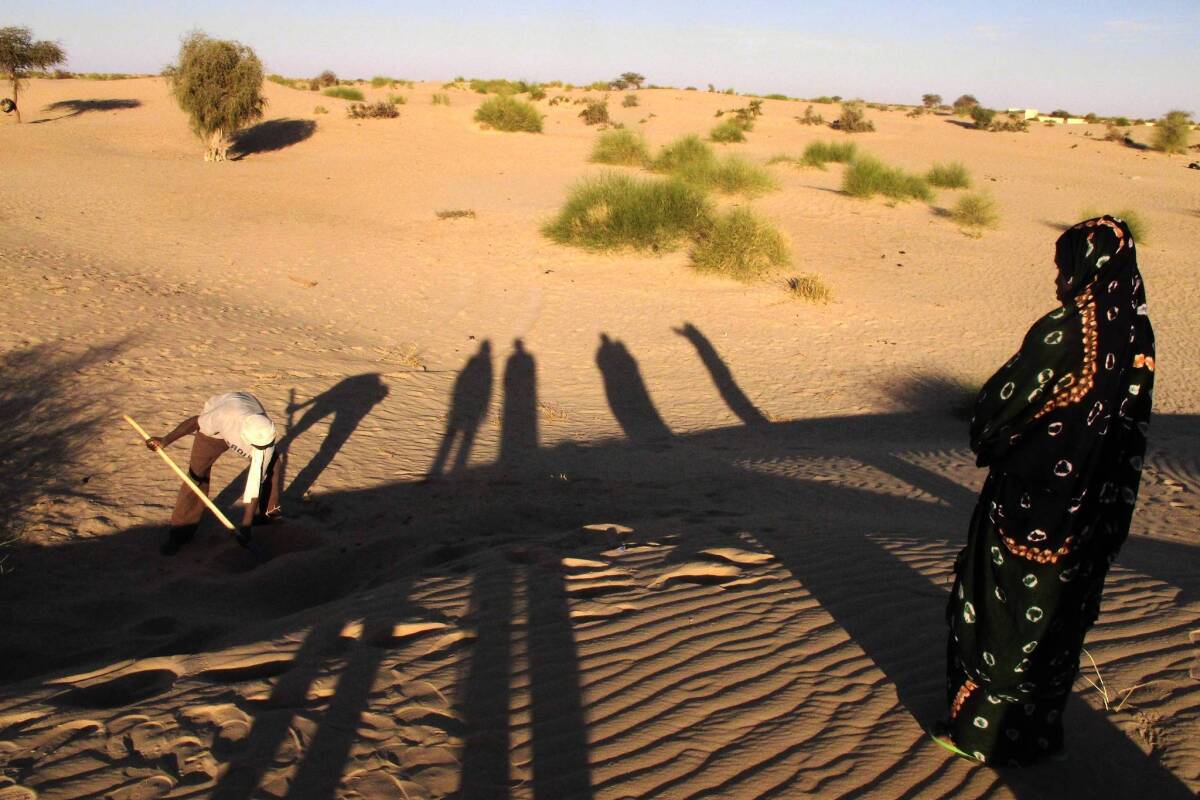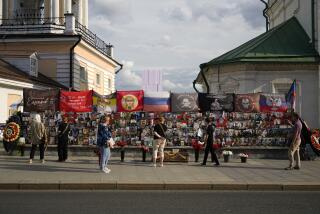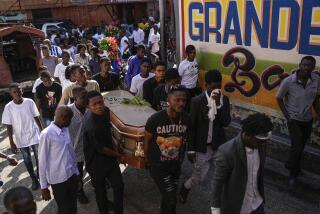Malians tell of executions by soldiers

- Share via
SIRIBALA, Mali — Like all the men in his family, Aboubacrine ag Mohamed, a farmer and Islamic teacher, donned a turban at the age of 23.
But these days, it’s a dangerous symbol for Tuareg like Mohamed, who have been targeted because they are members of the same tribe as leaders of several violent Islamist militias that took over much of Mali last year.
Mohamed, 36, was at home in Siribala last month under a shade-giving canopy after lunchtime prayers when a loud crowd of fellow villagers approached his gate, accompanied by two Malian army SUVs.
The soldiers, who had heard spiteful rumors that Mohamed was collaborating with the Islamists, got out and shot him dead, along with his uncle Samba Dicko, 72, witnesses said, one of a series of summary executions by the army in recent months.
“All the people accused us, saying we were friends of bad people,” said Mohamed’s elderly cousin Agaly ag Noa, wearing a traditional indigo turban and a wispy beard.
“You could hear them from my house,” said Noa, who had fled to his own house, 100 yards away, just before the SUVs arrived. “I felt such big pain I can’t describe it, and the shock is still going on.”
As France drove Islamic militants from cities and towns in northern Mali in recent weeks, corpses of noncombatants also started turning up, many of them Tuareg and Fulani herders, traditionally nomadic people who have roamed the region for centuries, oblivious of borders. Some have been killed by soldiers for having no identification papers.
Ethnicity is one of the more volatile elements in a conflict in which myriad tensions swirl. Among the points of friction are the religious divisions between Islamic fundamentalists and more permissive Sufis, long-held grievances among northern tribes against southern elites who have ruled the country, and a Tuareg independence struggle that also involves land in Algeria and Niger.
In Aguelhok, near the Algerian border, insurgents attacked a Malian army base in January 2012, and about 70 soldiers, outgunned and lacking ammunition, surrendered. They were slaughtered by Islamist militants in what Human Rights Watch has called “the single most serious war crime in this conflict,” and which could be a motive for the recent killings of Tuareg by troops.
In recent days, Human Rights Watch has reported numerous ethnic reprisal killings by the army, with the danger likely to rise sharply once France withdraws its troops — possibly as early as March — and leaves the Malian military in charge.
The reprisals follow a nine-month reign of terror by the Islamist invaders, who seized Timbuktu and other cities and imposed a harsh form of religious law that included amputation, flogging and stoning for offenses such as theft, alcohol trading, fornication and adultery. The brutality was a shock to Malians.
By the standards of this threadbare Malian village, Mohamed was too successful and well off to be very popular, Noa said. And emotions were running high after an Islamist militia occupied the nearby town of Diabaly in mid-January.
Noa believes that with rumors swirling that Mohamed was associated with the violent militants, villagers denounced his cousin at an army base in the town of Niono, 17 miles to the north. The village mayor told Mohamed that many saw him as a militant.
“He was very upset and afraid, but he had nowhere to go,” Noa said.
Drinking sweet, foamy tea with Dicko and Noa that fateful afternoon, Mohamed fretted that he needed to work on his rice farm but couldn’t leave the house.
When the military SUVs turned up, a mob of villagers, many of them children, gathered around, shouting, “Rebels in the village!”
Mohamed’s younger brother Sidi ag Mohamed, 20, vaulted the back fence and ran, but he continued to watch from a distance. He said he saw the soldiers raise their weapons to shoot Dicko. Afterward, the crowd looted the house, leaving nothing of value.
Two weeks later, Noa squatted in his house, where the cracks in the mud brick walls were as wrinkled and dry as his cheeks. He pulled out a cotton bundle with a confusion of papers, gathered in haste by the family from the mess left at his cousin’s home.
“Many of those people were our friends. We’d shared food with them,” said another brother of Mohamed, Yaya ag Mohamed Cisse. “That day the only thing people said to us was, ‘If you leave your house we’ll kill you.’ Even now they say it.”
The family couldn’t bury the bodies. Instead, authorities dumped them into a single grave, they said.
“The way they’d buried them shocked us. We’d never heard of two bodies in one grave,” said Noa, his eyes ringed with pouches.
“We heard about the jihadis on the radio, but there’s no relationship between us and those people,” said Cisse.
According to Human Rights Watch, soldiers killed at least eight Tuareg herders in Diabaly on Oct. 21, and on Sept. 8 executed 16 Mauritanian preachers on their way to a religious conference in Bamako, the capital. The apparently were suspect because they wore long beards.
Many Malians of other ethnic groups speak of Tuareg with hatred, calling them bad Muslims, dirty, immoral and prone to theft and deceit.
Corinne Dufka, West Africa director for Human Rights Watch, said ethnic tension was “dangerously elevated.” In Bamako, she said, Tuareg children were staying away from school because they were taunted as “rebels,” and some men had removed their turbans out of fear they would be targeted.
As the extremists who seized the north advanced south last month to attack the town of Konna in central Mali, the army rounded up Tuaregs and Fulanis, according to a Malian army sergeant interviewed by The Times who was in Konna. His name is being withheld to protect him from reprisal.
The sergeant said at least five Fulani herders were arrested by soldiers in two incidents in Konna last month. They were taken to a police station and army base in neighboring Sevare, he said, then killed and dumped in a well next to the police station. He said he knew of three others killed in another incident.
“They asked for a volunteer to execute them,” said the sergeant, referring to two men arrested in Konna. He was later told by other soldiers that the men had been killed and thrown into the well.
“I was there. I said I couldn’t do it. If you have parents, you can’t do it because you have a kind of pity.”
The same happened with three other herdsmen, whose parents recently called him to say they hadn’t seen or heard of their sons since the army had seized them, he said.
Two weeks after the incidents, the smell of decomposing flesh rises from the well and the shape of a man’s head is just visible in the darkness. An Associated Press close-up photograph of the well’s interior clearly shows at least three bodies.
The sergeant said an army lieutenant appeared to relish killing Tuareg and told other soldiers, “We’re fed up with these Tuareg.” The lieutenant, he said, also forced two Tuareg men to butcher two others with knives and shot a third.
“You can’t glorify that,” said the sergeant. “I was upset because we have justice in Mali, and you could bring them to a police station to investigate them.”
To traditional Tuareg, donning the turban is a rite of manhood, and once a man wears it, he cannot take it off. For many, the decision to remove the turban to blend in and avoid attacks is agonizing. For others, it’s unthinkable.
For Aboubacrine ag Mohamed’s family, there may never be justice. In Siribala, Yaya ag Mohamed Cisse reported the killing of his brother and uncle to the mayor, who told him a complaint could be filed only at the army base in Niono.
“The mayor advised me to go without a turban,” Cisse said. “He was afraid I’d be killed if I wore one. But I said, ‘I can’t do that.’”
More to Read
Sign up for Essential California
The most important California stories and recommendations in your inbox every morning.
You may occasionally receive promotional content from the Los Angeles Times.










